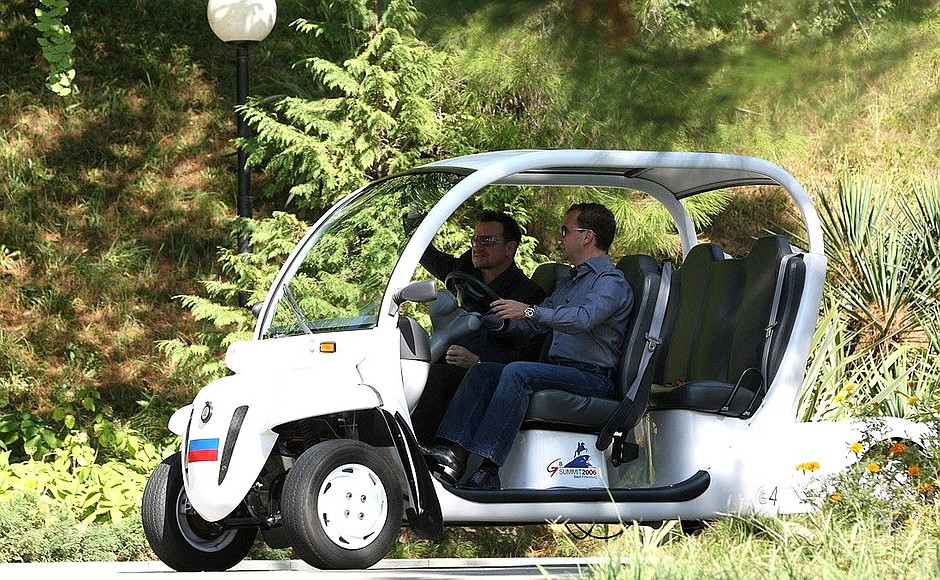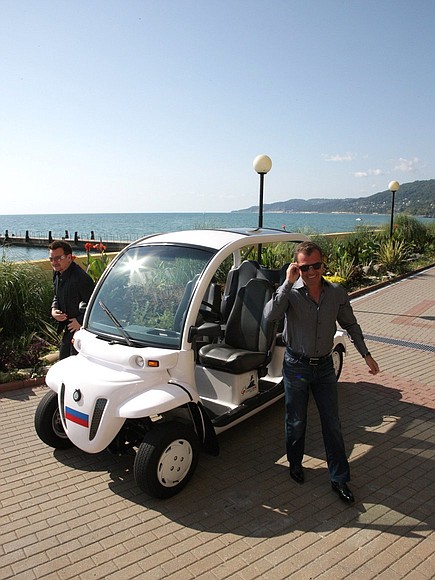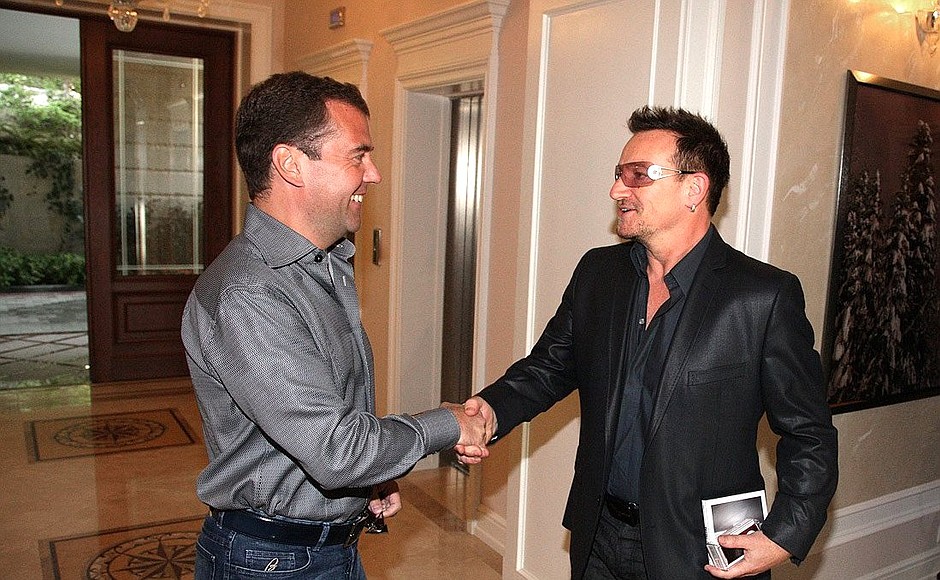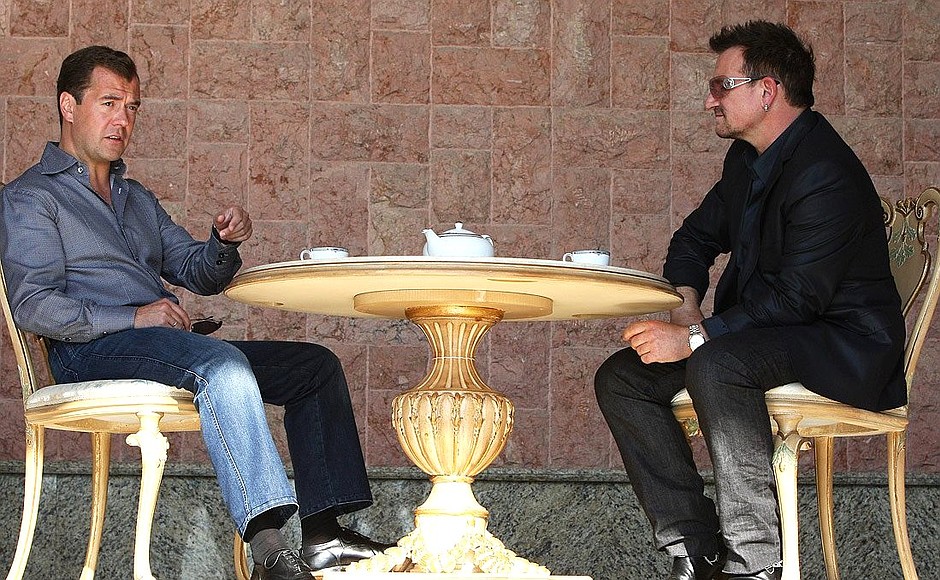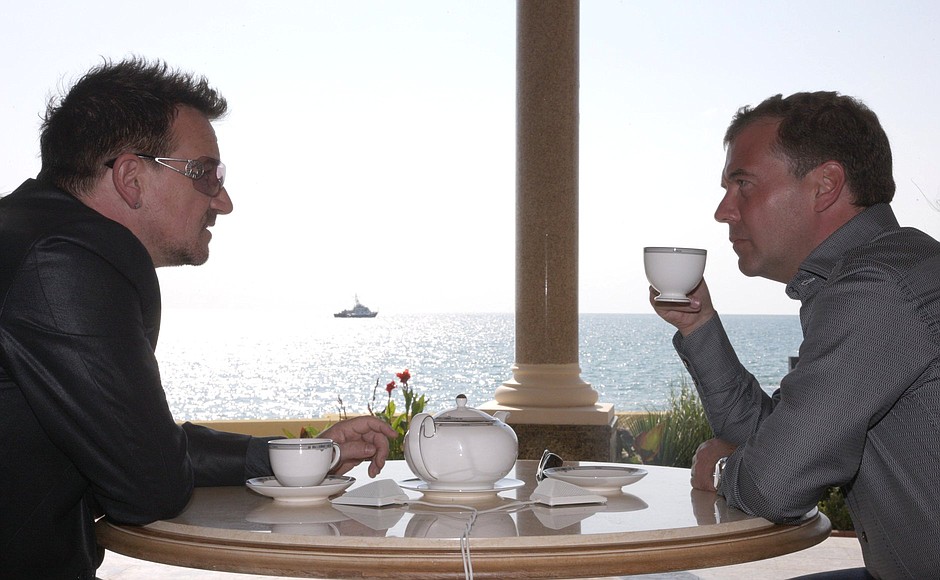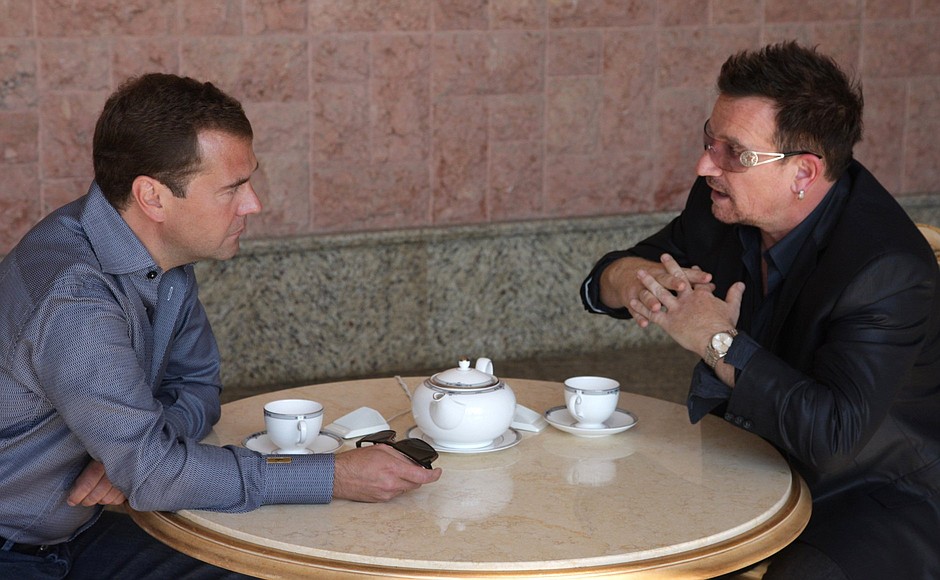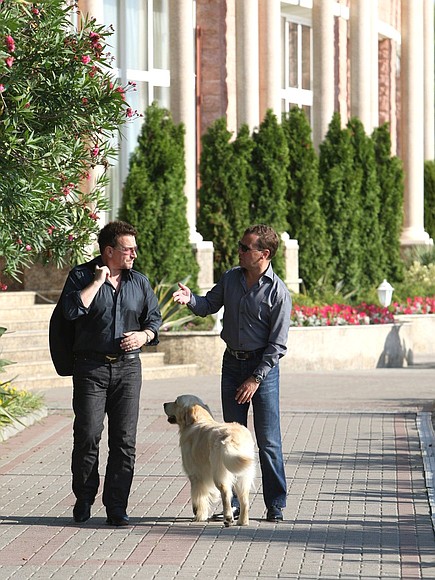The meeting took place in an informal setting at the President’s Sochi residence. Bono also presented Dmitry Medvedev with several CDs of his songs. The rock star is in Russia as part of U2’s world tour to promote the band’s new album.
* * *
President of Russia Dmitry Medvedev: I am very happy to meet you!
You have many fans throughout the world, and your music unites many generations of people in many nations.
I think that today we will talk about more than just music, because the social activity you and your colleagues are engaged in has garnered a great deal of respect throughout the world. You are indeed doing important work, because caring about people is not only the job of politicians.
Each one of us is capable of making his own contribution to resolving difficult problems such as maintaining people’s health, fighting poverty, and providing disaster relief. And in my opinion, the fact that you are actively doing these things is wonderful.
But it doesn’t strop you from writing great music, because when people actively engage in social activity, the music ends. But this has not happened to you, and I hope that it never will.
Bono: Thank you, Mr President.
You know, I come here as a student of Russia. I have a lot to learn about this great nation. And I come here to cross a great divide between me, the Led Zeppelin fan, and you, the Deep Purple fan.
Dmitry Medvedev: I like Led Zeppelin, too.
Bono: I’ve read – as an Irishman, we read of this great country, and we read – and I hope this doesn’t sound corny – but we read about the Russian fighters who saved us from the fascists at great cost. And the resilience of the Russian people is something that I’m very interested in. I want to learn more about that.
I’m also interested in your leadership on tackling some of the great problems in the world. I know you have problems, we all have problems in our own countries. But there are great problems out there in the world. One of them for me, that’s on my mind today, is that it costs forty cents a day to stop somebody dying from AIDS. It costs forty cents to stop a mother from passing the AIDS virus on to her child. And we believe that by 2015, we can stop that in the world. No longer a child will be born with HIV/AIDS that’s passed from the mother.
It’s a campaign. I gave you the iPod from Steve Jobs. He’s a great supporter of this with the Red Campaign. And I was going to ask for your help and advice on that. Maybe we can find a Russian company, a red Russian company.
Dmitry Medvedev: I would also like to say that this is a great programme. You know why? Because it is an entirely concrete programme, and it is a way to resolve a serious problem. We will think about how Russia might be able to participate.
Bono: That’s music to my ears. There’s also other – what we sometimes refer to as low-hanging fruit. Polio is nearly eradicated. Polio is very close. And I know that Bill Gates wanted to also say hello to you. He is very involved, with the Gates Foundation, in eradicating polio, and I think there’s some stuff we can do there.
Dmitry Medvedev: Indeed, polio is an issue that should be of concern to all governments, because only a little while ago, it seemed that this disease was just about disappearing from the face of the earth, thank God. But since then, there have been several outbreaks.
And even this summer, we were dealing with this problem, because unfortunately, a number of our neighbouring nations have been affected by this problem. And overall, we need to spend money on these kinds of diseases, especially in nations that have financial problems – first and foremost, African nations.
Bono: I spent the month of March on the continent of Africa – north, south, east, west, all over. And I got very excited by some of the things I was seeing. A new entrepreneurial class. A strong civil society that is determined to fight corruption. And I know that in 2008 you started the fight against corruption here. And I would like you to know that working with President Obama and the United States Senate for the finance bill which refigured the entire financial system in the United States, we campaigned and achieved an amendment in the finance bill for extractive industries’ transparency, so that any company on the New York Stock Exchange now has to publish their results. I thought this would please you, and I was going to ask you for advice in how to follow that through in Europe and in Russia.
Dmitry Medvedev: With regard to disclosure: a long time ago, I practiced law, and indeed, it is an important element in economic openness. All nations have disclosure rules: the US, European nations, and Russia. The real question lies in the enforcement of these rules; often, companies do not want to talk about their problems.
This can cause financial crises and economic problems. It means that we need a firmer system of disclosure and we need to introduce responsibility for accounts so disclosed, including liability on the part of the auditing company.
Within the G20, we still have not been able to agree on common criteria to be used by auditing companies. We are looking into and discussing this issue, but so far, we have not come to an agreement on this problem, so I will have to resort to a “drastic” measure: I will tell them about our conversation.
Bono: Tell them we’re coming to a stadium near them.
I know you had a very successful meeting with President Obama. Did you really like the hot dog?
Dmitry Medvedev: Let me be diplomatic. Hot dogs are a delicious food, but I don’t eat them very often.
